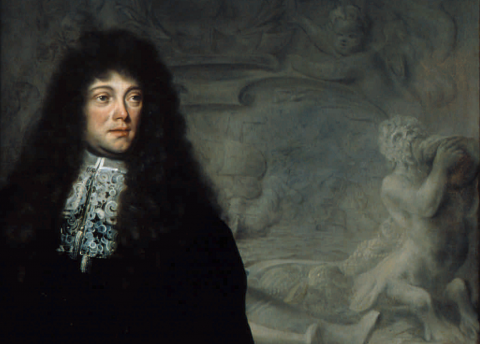Pieter de Frans, or Petrus Francius as he was known in Latin, was the son of an Amsterdam wine merchant. He hailed from the city’s upper classes, studied in Leiden and took his doctorate in France, at the University of Angers. He undertook a two-year scholarly tour of England, France and Italy, and made many important friendships in those years. Francius was a brilliant classical linguist and in 1673, just after the Rampjaar [disastrous year] of 1672, he was made professor of rhetoric.
In the final quarter of the seventeenth century, Latin was losing its importance as the international language of scholars. This was the result not only of the rise of national languages, but also of the rise of a new kind of science. Knowledge based on classical antiquity was becoming less important, while the natural sciences were gaining ground. Petrus Francius was a representative of a form of knowledge that was on the wane – although that is not how he would have seen it.
In this painting, he is posing in front of the memorial to the great admiral, Michiel de Ruyter. The painting dates from 1688, and the memorial from 1677. At its unveiling, Francius recited a poem that was as artful as it was artificial, of no fewer than 1,000 lines and in Latin. This recitation must have lasted at least half an hour, and you might wonder which of those present would have been able to follow the learned professor. This was a high point for Francius. Eleven years later, he had himself immortalised in front of the memorial, dressed in his finest clothes and sporting an impressive wig, to indicate his high social status.
In Amsterdam during the Golden Age, the admirals of the Dutch fleet were honoured and revered. Admirals were important servants of the States of Holland and the honour that they were shown also served as a counterweight to the accolades that were bestowed upon the stadtholders of the House of Orange. The merchants, who were oriented towards the sea, thereby distanced themselves from the stadtholders and their ambitions on the European continent.
